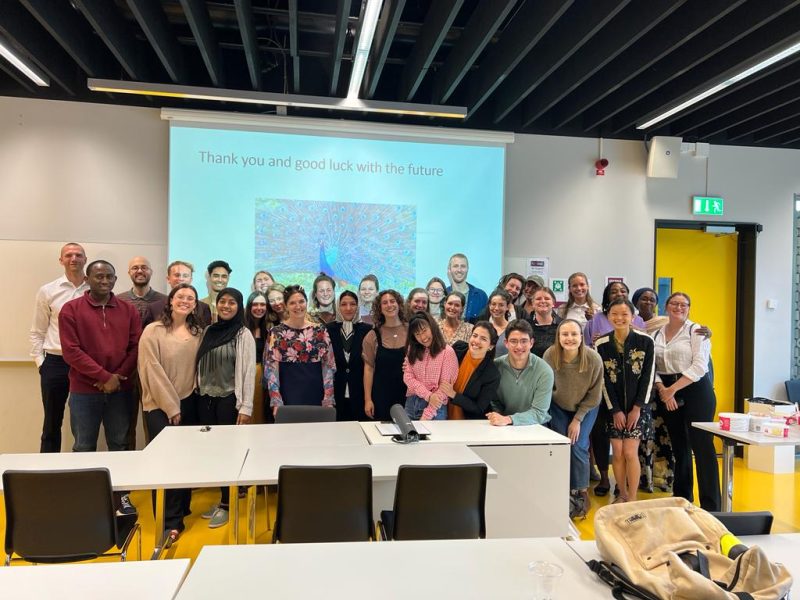
The Master’s of Global Health thesis course
I have gotten several emails from you guys about the thesis course in Global Health. And I get it. We are only here for one year but we are expected to produce a full-length thesis and defence at the end of it. I too worried a lot about how I would find a topic or whether I would find a lecturer to take me on as a student. And I have to admit, the process was not easy. So, I am here to ease your fears about the thesis project. Note that this would not be a review of the course, since it isn’t over yet. However, it would be more of a recounting of events that occurred. So here is my story.
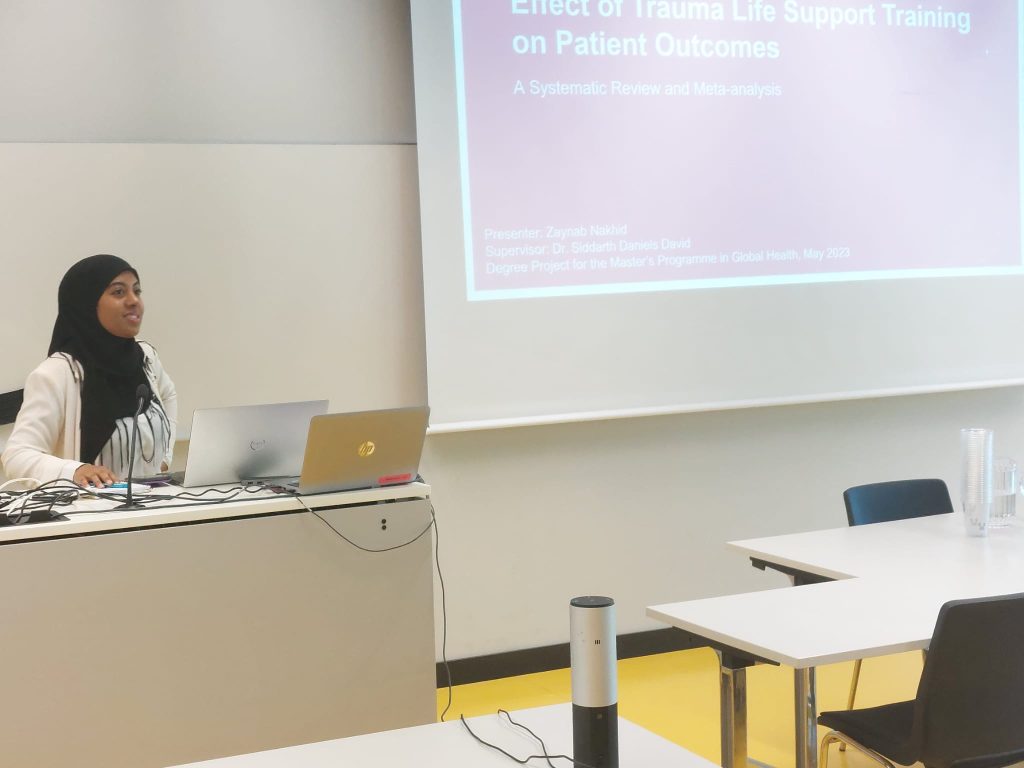
Before coming to KI, I have to say that I was most nervous about the thesis. I was interested in global health but had limited contact with the field beyond my internship, which I had not yet completed at the time. I was not sure how I would be expected to come up with a topic when I did not know very much about the discipline. So I approached the Digital Ambassador of Global Health for that year, the same way many reached out to me, and her answer made me worry even more. It was worse than I thought! We had to start looking for a thesis by September.
Armed with this knowledge I began looking online for research gaps in Global Health. However, nothing really appealed to me.
Fast forward to September, and our programme leader introduced herself as the course leader for the thesis project, along with the other course leader. The thesis was meant to be a year-long course that sort of ran alongside our other courses. Fair enough. I figured it would take time to complete. Our first task was to find a thesis project, and this could be done in four ways.
- Think of your topic and find a Professor or lecturer willing to take you as a student.
- Ask a Professor/lecturer if they had any data sets and would be willing to take you on to complete some research or a topic they had in mind.
- Choose one of the topics our wonderful course leaders (CLs) reached out to find us from across the departments.
- If an organisation or Professor/lecturer from another university had a topic that you were interested in, you could approach them and ask them to do the thesis in collaboration with someone at KI.
Or we could just run away. Which is what I wanted to do when faced with the daunting task of reaching out to people who had never heard my name, or who I had just read about but never met in person. This, coupled with the fact that I was new to this school and did not know anyone just made me anxious enough to try getting a project on time.
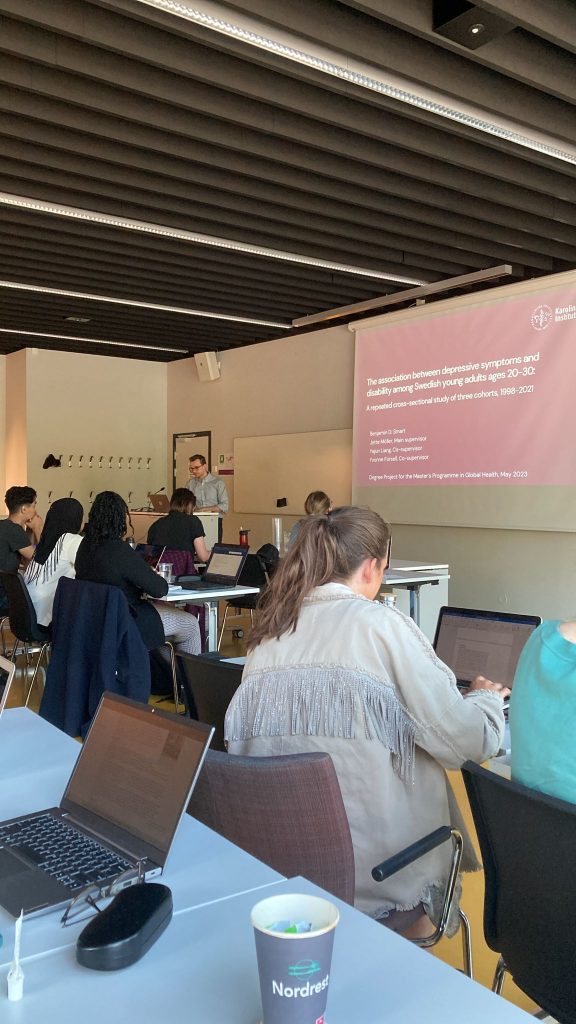
Once you find a project, the next step begins in December. This is actually a series of steps that sort of occur all at once after months of doing the search. First, you have to get your supervisor to sign the statement that they are willing to take you on as a student which you then submit so that our dear CLs know that you are not struggling to find a project.
Then comes the actual work. We submit a project outline so that the CLs could assess whether your project idea is feasible or not. If not, you either have to review or find another thesis. Next, is the project proposal. This is much more in-depth and I assume it was done to test our knowledge of the field in which we would be conducting the research. Honestly, it might just be the CLs way of getting us to move and get stuff done. Which when you have a ton of work piled up is the last thing you want to pay attention to, but it was actually a very effective way of getting us to be at a certain point at a certain time.
So, you lose Christmas, BUT! you gain knowledge. A pretty fair trade-off if you ask me. December me would not agree with this statement as I wished everyone a terrible holiday but May me is grateful for the head start.
To round up the holidays and welcome the New Year, we had the proposal seminars. And they are exactly what you are imagining. A presentation in front of the entire class where anyone and everyone can ask you questions about your supposed thesis that you have not even done yet and only know about in theory. The good thing about this seminar is that the CLs ask you super difficult questions that you will have no idea how to answer. BUT! On the bright side, you will know what you do not know which is perfect for you to begin learning. And improving. So again, more knowledge gained is also fair.
There is a bit of a pause as classes resume and we have exams and the like. However, some people are expected to begin working on their thesis around this time by sorting data or reading endless literature on the subject. I would pinpoint this time as the most difficult time-wise because you now have a thesis and a supervisor who expects you to work while having no time to actually work.
Anyway!
Next, the actual thesis period begins. Guys I was lucky enough to have a supervisor who allowed me to send stuff in late until this period began. He really worked with me, however, please take my advice. Do not do it. Do not be a Zaynab and wait. Stop with the excuses. Begin this research in January if you can. It all comes at you so fast, I wish I had stayed awake a couple of weekends and started instead.
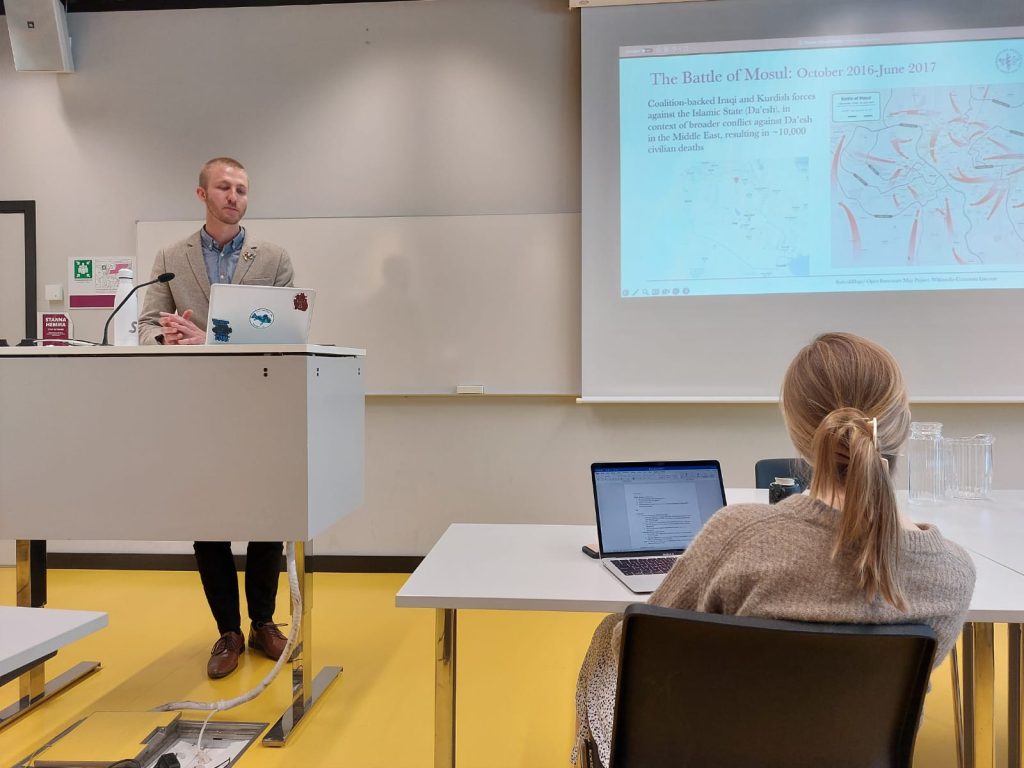
Now, during this dedicated thesis time, I did not travel. However, it is a dedicated thesis time for a reason. Some students have to travel to other countries to collect their data, some of us have to work in offices with our supervisors to get the data and clean it. Others begin their research during this time while they work day and night to get everything ready for our half-time seminars. Personally, this period of collecting my data was nerve-racking. Like I told you guys, I began a little late, so I was pulling in days of staring at my data and nights of sending my supervisor and grand supervisor (I made this term up because I do not know what to call him) endless emails asking if I was doing anything right. I should note that while I type this with the thesis deadline, a week away, I have not changed. Do not be like me, new class, begin early.
During the half-time seminars, you are put into groups where you present your methods and some preliminary data. The expectation at this time is that you have some sort of results or have an idea of what your results might show. This is not an examination. But rather a time to show the CLs where you are and that you are on track. They also speak to you privately afterwards to make sure that everything is okay and that there are no problems in your research.
After this half-time seminar, it is basically a race to finish the thesis by the deadline. The thesis deadline is described as the exam seminar version then we have to submit the thesis anonymously. That is, no names in the thesis or names of your supervisor or anyone by whom you can be identified. This is given to an examiner who will grade your thesis and assess what needs to be improved.
Beware: most students think that you could be halfway done with your thesis at this point. However, your thesis should be fully complete at this point so that you receive a proper grade and feedback. If you leave out your discussion there is no telling how you would be graded. But also your feedback will be incomplete.
One week after submitting we have the examination seminars. This part is an actual exam where for one week we have to attend the thesis defence of everyone in the GH class. Attendance is mandatory and anyone is allowed to come and watch the defence. The schedule is usually put up in the department and our friends and family can join via Zoom.
The layout of the defence is that you have 10 minutes to present, then 10 minutes to be questioned by a peer, 15 minutes of questions by your examiner who will reveal themselves to you for the first time and then 10 minutes of questions from the audience. Afterwards, you are taken to a room for 5 minutes for a one-on-one with the examiner.
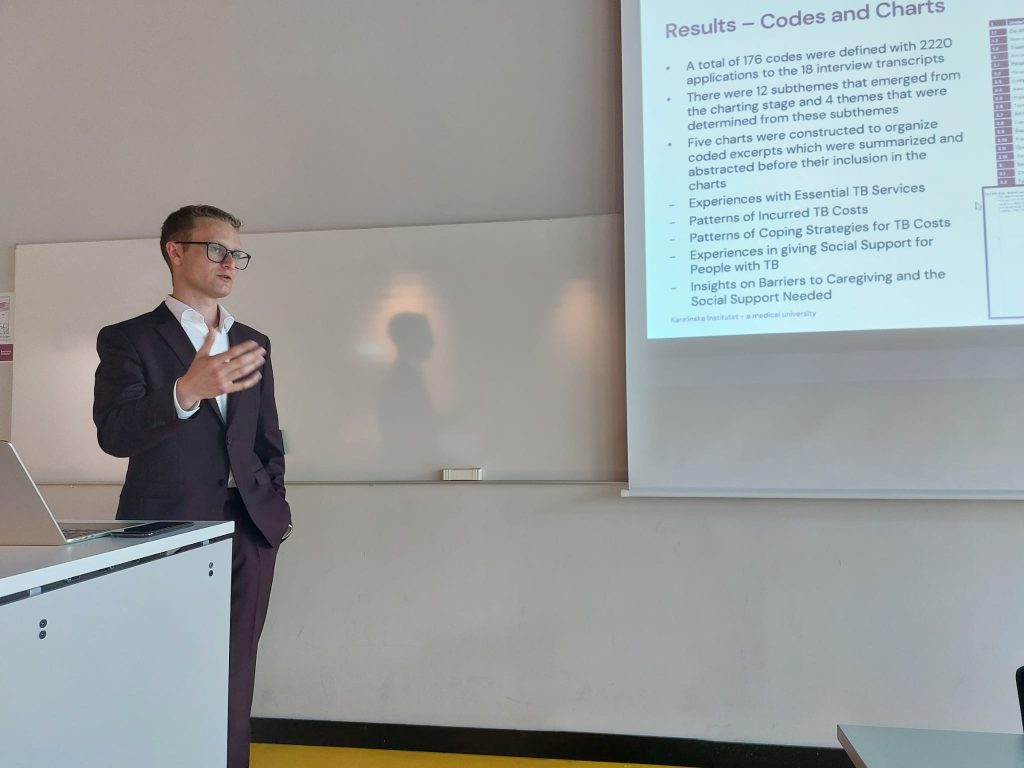
And this is where I am at this moment. I just finished my defence and am expected to implement some changes before submitting the final version of this thesis.
How did it go you may ask? Well, the questions were difficult, and there was definitely one that I could not answer. Also, neither the CLs nor your supervisor can help you so you are all alone at this moment. But once it is done, the feeling of relief is honestly worth it. I got through it and so will you.
This entire process is long and is a determining factor in obtaining your Master’s since it is worth 30 credits which are half of the credits for the entire Master’s programme. However, our CLs are amazing and stay with us every step of the way. Throughout the thesis period, the CLs have many points of contact with us including private meeting times which you can sign up for to get answers to any questions that you might have. They also work day and night to make sure that we are where we are supposed to be. If I can I would love to thank our CLs on behalf of the entire 2023 class, for putting up with us. For sitting through presentation after presentation, sometimes with the same repetitive information from before. I am sure it was not easy, but there they were replying to each email and helping us along the way. And they will be there for you guys too! So!
Good luck!
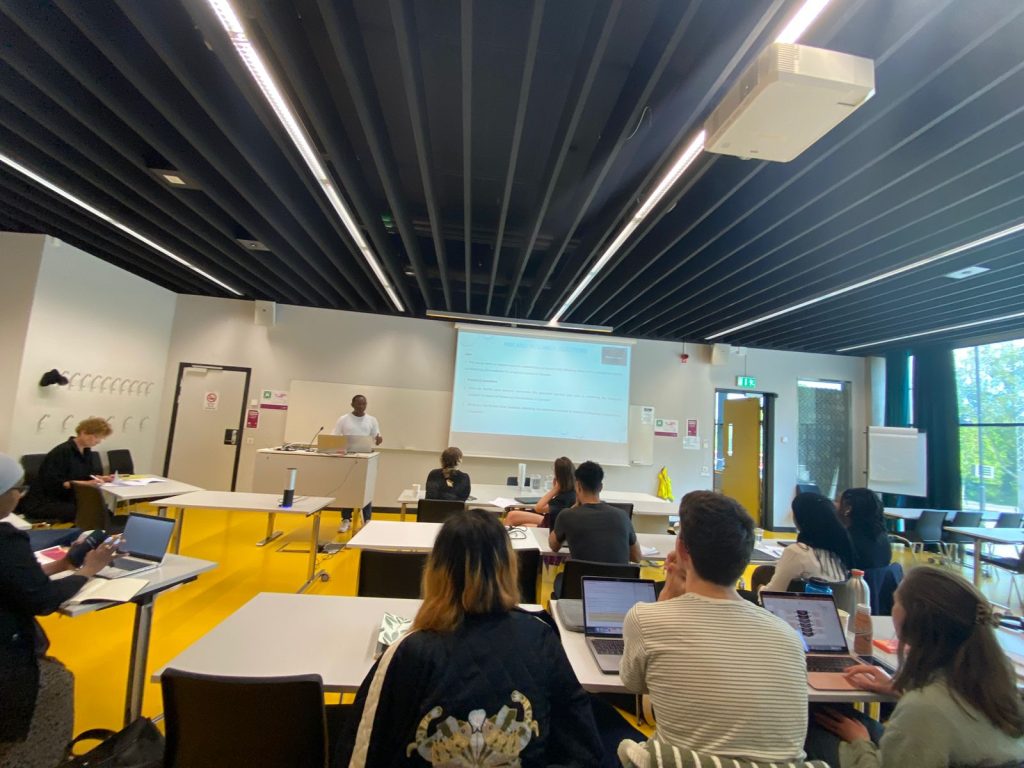
Zaynab - Global Health
Hi, my name is Zaynab and I am from Trinidad and Tobago, a country in the Caribbean. I am currently studying a Master’s in Global Health here at KI and am a blogger for the DA team. I look forward to sharing my experiences at KI and I also hope to expose students from the Caribbean to university life here in Sweden.

0 comments